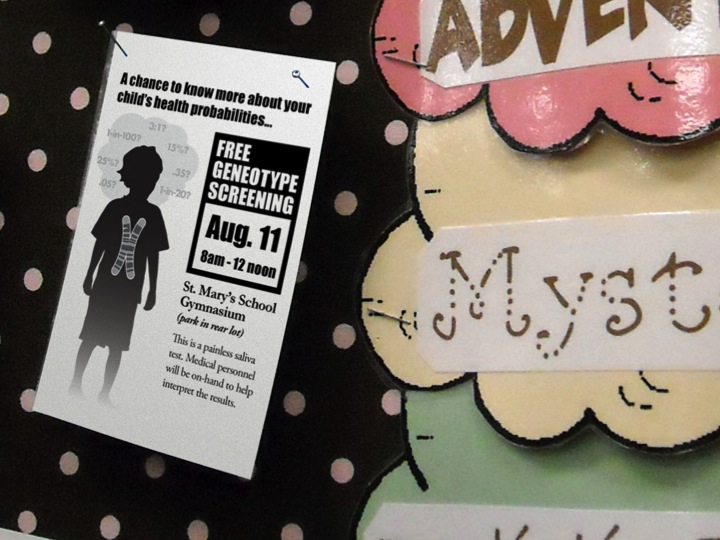Future Now
The IFTF Blog
The Geneticist Will Skype you Now
One of the more startling statistics I learned last year came from something by geneticist and science writer Misha Angrist: At least as of a couple years ago, there were roughly as many board-certified physician-geneticists as astronauts in the United States. This is a problem, given that our need for trained geneticists is likely to be a great deal higher than our need for astronauts in the coming decade.
We were thinking about this coming demand for genetic testing when we made the artifact from the future below for our HC2020 map--which puts us into a world where getting a genetic scan is a routine part of growing up--not too different from an eye exam or physical, just a lot more difficult and time consuming to explain, since with only a handful of exceptions, genes don't predict disease, but instead offer probabilities that certain diseases are more or less likely. We called this idea "probabilistic medicine."

When we made this artifact, I imagined seeing signs like this dotting suburban landscapes and city streets urging well-intentioned parents to learn more about how to take care of their children, along with hastily trained nurses and doctors and counselors walking through the arcane math of genetic testing with nervous parents and patients.
Of course, we also made the artifact before the release of the recent GAO report about direct-to-consumer genetic testing with big bold section heads like "Test Results are Misleading and of Little Use to Consumers." The FDA has also started notifying genetic testing companies that direct-to-consumer genetic testing qualifies as a "medical device" which could potentially subject genetic testing to federal regulation. Whether or not these tests get regulated--and what those regulations could look like--are obviously open questions. That said, I'd be awfully nervous if I worked at 23andMe, or any of the other direct-to-consumer testing companies.
At the same time, I don't think that even the strictest regulations would spell the end of direct-to-consumer genetic testing.
At the Genomics Law Report, Dan Vorhaus offers this take:
There remains a broad spectrum of possible responses available to Congress and the various regulatory agencies now scrutinizing the field of genetic testing and, while today’s events did not paint DTC genetic testing in the most favorable light, the industry and many of its companies have received considerable (and deserved) praise on other days....
No matter what comes next, over the long term I continue to believe – based on my day-to-day interactions with investors, companies, consumers and researchers – that there is considerable demand for direct consumer access to personalized genetic information. And this demand is only going to increase with time.
In other words, the future of regulating genetics is up in the air, but demand for testing in the United States--regardless of what regulatory decisions get made--is likely to continue to grow.
Daniel MacArthur, who just launched Genomes Unzipped with Vorhaus, has a slightly different, but very insightful take about where we might see that demand finding its supply, so to speak:
Finally, I do expect the industry to survive; but if the regulators have their way, it won’t be in the US. Instead, the startups and entrepreneurs that are building the technologies required for the new era of genomic medicine will quietly pack up their tools and move to Singapore and Hong Kong. That’s great, but things are different in Singapore. People will still be buying genetic testing products; but an opportunity to build a scientifically-based, socially responsible personal genomics industry in the US will be gone.
And that's the thing about genetic testing. It's no more difficult to send a vial of saliva from Texas to California than it is to send one from Texas to China.
Which is another way of saying that I can still see our genetic testing artifact in the future, regardless of what happens in the regulatory sphere in the United States. But that flyer might not be on a telephone poll by your neighborhood school. One day, you'll be poking around on Facebook and you'll see a little banner ad that reads: "Learn more about your child's health probabilities." But you won't take your kid to a community center or school to find out those genetic risk probabilities; you'll walk over to the computer and Skype over to India or China for a counseling session.
(For some great analyses of the recent GAO report on direct-to-consumer genetic testing, check out: here, here, and here. 23andMe also offers a pretty good defense of its service here. And if you want even more information, you can check out the full GAO report in pdf form here.)



